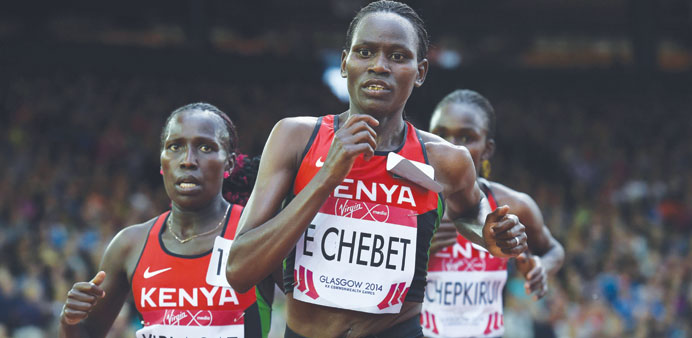This July 29, 2014 file photo shows Kenya’s Emily Chebet (C), Joyce Chepkirui (R) and Florence Kiplagat (L) competing in the final of the women’s 10,000m during the 2014 Commonwealth Games in Glasgow. Chepkirui won gold, Kiplagat silver and Chebet bronze. Two-time world cross country champion Emily Chebet was given a four-year ban for using the drug Furosemide, one of the seven athletes Kenya has banned for doping offences.
AFP/Nairobi
Kenya has banned seven athletes, including two women sprinters sent home from the World Championships in Beijing, for doping offences, Athletics Kenya said yesterday.
The government’s athletics body “confirmed the sanctioning of the athletes for various doping offences,” with bans ranging from two to four years, AK said in a statement.
Sprinters Francisca Koki and Joyce Zakari, who were provisionally suspended by the IAAF and sent home from the Beijing world championships in August, were each given a four-year ban.
They were found guilty for using a prohibited substance, Furosemide.
After the pair tested positive in Beijing, Kenya’s Deputy President William Ruto announced plans to criminalise doping.
Many in Kenya fear doping is rife among their top class runners, who have been the source of enormous national pride.
The success of Kenya at Beijing -- topping the medals table for the first time since the championships started in 1983, taking seven golds, six silvers and three bronze medals -- was tarnished after Manunga and Zakary failed drugs tests.
Two-time world cross country Emily Chebet was also given a four-year ban for using the same drug Furosemide.
Marathon runner Agnes Cheserek tested positive for Norandrosterone and will serve four years.
Three other distance runners, Bernard Mwendia, Judy Kimuge and Lilian Moraa Mariita, each received two-year bans.
Mariita, the 2012 Miami half marathon winner, was caught doping with the blood-boosting hormone, EPO.
Kenya, under scrutiny amid allegations of widespread doping in world athletics, earlier this month announced the establishment of an anti-doping agency, with the aim of easing concerns over the east African country’s internal anti-doping policy.
Earlier this week athletes barricaded AK headquarters in Nairobi in protest against corruption and lack of efforts to fight doping in the sport.
Dozens of Kenyan athletes have been suspended or banned since 2012 after testing positive for banned performance-enhancing drugs, among the marathon star Rita Jeptoo.
Doping expert Ashenden attacks IAAF
DPA/Berlin
Australian doping expert Michael Ashenden on Saturday heavily criticized the athletics ruling body IAAF for its response to the ongoing doping scandal.
On Friday the IAAF dismissed allegations it tolerated widespread blood doping in the sport based on abnormal values in thousands of tests.
“The IAAF has released a statement that comprises 25 pages of hair-splitting, plus 13 pages of appendices,” Ashenden said in an open letter.
German TV network ARD and British newspaper the Sunday Times reported in summer that a leaked IAAF database with 12,000 blood tests from around 5,000 runners suggests that a third of medallists in endurance events at Olympics and worlds between 2001 and 2012 had suspicious readings.
Ashenden was one of two experts enlisted by the Sunday Times to analyse the data.
But, in a long statement, the IAAF insisted the allegations lack “any scientific or legal basis” and claimed results “are only reliable, and may only be fairly compared with the results from other samples in that athlete’s profile.”
However, Ashenden hit out at the body for discrediting his analysis seriously and for attempting to distract from its role in the affair.
“The irony of a disgraced federation casting aspersions is not lost on me,” Ashenden wrote. “But their deliberately bloated document, no doubt intended to muddy the waters, cannot go unanswered.
“I have argued previously that there is a place for prudence when launching legal actions based on suspicious blood results.
But the blood values were so extreme, over such an extended period, that they should have tried to do something, anything. The IAAF were legally timid when they should have been morally strong.”
An independent commission of the World Anti-Doping Agency (WADA), chaired by former chairman Dick Pound, recently recommended Russia be suspended from athletics for implementing a programme of systemised doping. The IAAF endorsed the ban but was criticized for its approach to blood profiles.
“It is not just the Sunday Times or German broadcaster ARD questioning whether the IAAF ‘idly sat by and let this happen’,” Ashenden said.
“The independent commission has identified corruption and bribery practices at the highest levels of international athletics, currently under investigation by Interpol. A complex conspiracy involving the IAAF.”

